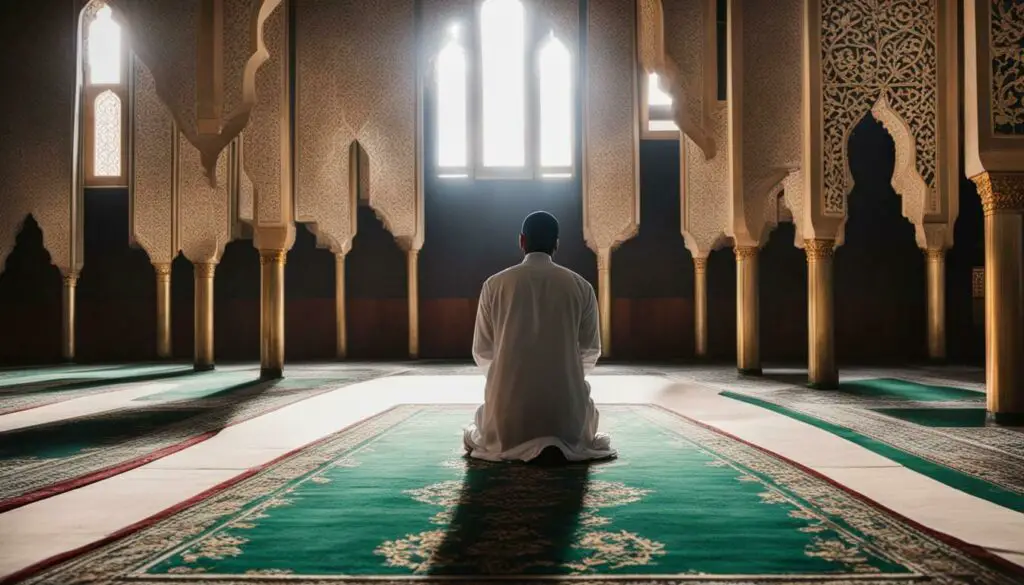Last Updated on October 15, 2023 by Francis
Fajr prayer is an integral part of Islamic worship and culture. It is the first of the five daily prayers that Muslims observe as a way to connect with Allah and seek guidance throughout their day. Fajr prayer is performed before the sun rises and holds significant spiritual significance within the Islamic faith.
In this section, we will take a closer look at the concept of Fajr prayer in Islam, its importance, and its place within the Muslim community. We will explore how this early morning prayer sets the tone for the rest of the day and how it can bring about personal transformation in the lives of Muslims.
- Fajr prayer is the first of the five daily prayers observed by Muslims.
- Performing Fajr prayer holds significant spiritual significance within the Islamic faith.
- This early morning prayer sets the tone for the rest of the day and can bring about personal transformation in the lives of Muslims.
Contents
Understanding Fajr Prayer
Fajr prayer, also known as the dawn prayer, is an essential part of the five daily prayers prescribed to Muslims. It is the first prayer of the day, and its significance and benefits cannot be overstated.
The importance of Fajr prayer lies in its ability to set the tone for the entire day. By waking up early and performing this prayer, Muslims demonstrate discipline and commitment to their faith. It also serves as a means of seeking forgiveness and guidance from Allah.
The benefits of Fajr prayer are numerous. It helps to purify the soul, strengthen faith, and cultivate a sense of inner peace. It also allows one to prioritize their day and stay focused on their goals and obligations.
The significance of Fajr prayer can be seen in the fact that it is mentioned specifically in the Quran, where Allah says: “Establish prayer at the decline of the sun [from its meridian] until the darkness of the night and [also] the Qur’an of dawn. Indeed, the recitation of dawn is ever witnessed.” (Quran, 17:78)
In addition to its spiritual benefits, Fajr prayer also has physical benefits. Studies have shown that waking up early and performing a physical activity like prayer can improve mental health, increase productivity, and boost energy levels.
Overall, Fajr prayer serves as a powerful tool for personal growth and spiritual development. By prioritizing this morning prayer, Muslims are able to strengthen their connection with Allah and uphold the values of their faith.

“The Prophet (peace be upon him) said: ‘The two Rak’ah (before) the dawn (Fajr) prayer are better than this world and all that it contains.'”
– Sahih Muslim
Performing Fajr Prayer
Performing Fajr prayer is a crucial element in the daily lives of Muslims. It involves specific movements and recitations, which are important to understand and follow to ensure the prayer is performed correctly.
Here’s how to perform Fajr prayer:
| Step | Description |
|---|---|
| 1 | Begin by making the intention to perform the Fajr prayer. |
| 2 | Perform the ritual ablution (wudu) to purify yourself before prayer. |
| 3 | Stand facing the Qiblah (direction of the Kaaba in Mecca). |
| 4 | Make the Takbir (saying “Allahu Akbar” meaning “God is the greatest”) to begin the prayer. |
| 5 | Recite Surah Al-Fatiha, the opening chapter of the Quran. |
| 6 | Recite another portion from the Quran, such as Surah Al-Ikhlas. |
| 7 | Bow down (Ruku), saying “SubhanAllah Rabbil ‘Azim” (Glory be to Allah, the Most Great). |
| 8 | Stand up straight and recite “Sami’Allahu liman hamidah” (Allah hears those who praise Him) and then “Rabbana lakal hamd” (Our Lord, praise be to You). |
| 9 | Prostrate (Sujud) with your forehead, nose, hands, knees, and toes touching the ground, saying “Subhana Rabbiyal A’la” (Glory be to my Lord, the Most High). |
| 10 | Sit up straight and say “Allahu Akbar” to begin the second prostration. |
| 11 | Prostrate again and recite “Subhana Rabbiyal A’la” (Glory be to my Lord, the Most High). |
| 12 | Sit up straight and recite the Tashahhud, a declaration of faith. |
| 13 | Say the Salam to conclude the prayer by turning your head to the right and saying “Assalamu ‘Alaikum Wa Rahmatullah” (Peace and mercy of Allah be upon you) and then to the left saying the same. |
Remember, the Fajr prayer is a time for reflection and connection with Allah. Focus on the recitations and movements of the prayer, and let it guide your spiritual journey.

Fajr prayer holds significant rewards and blessings for those who perform it faithfully. It is stated in a hadith that “Whoever prays the dawn prayer in congregation, it is as if he had prayed the whole night long.” (Sahih Muslim) This shows the immense spiritual benefits of Fajr prayer.
| Rewards of Fajr Prayer: | Description: |
|---|---|
| Increased productivity: | Starting the day with Fajr prayer can help increase productivity and set a positive tone for the rest of the day. |
| Forgiveness: | Offering Fajr prayer can be a means of seeking forgiveness from Allah and purifying oneself of sins. |
| Stress relief: | Fajr prayer can serve as a stress-relieving and calming experience, providing an opportunity for peace and reflection. |
| Closer to Allah: | Performing Fajr prayer consistently can bring one closer to Allah and help cultivate a stronger connection with Him. |
“Allah’s Apostle said: ‘The two Rak’ah of Fajr are better than this world and all that it contains.’” (Sahih Muslim)
These rewards and blessings highlight the significance of Fajr prayer and its impact on one’s spiritual journey.

Performing Fajr prayer can be a transformative experience, offering spiritual growth and personal reflection. By making Fajr prayer a consistent practice, Muslims can reap the rewards and benefits that come with this early morning ritual.
Importance of Waking Up for Fajr Prayer
The Fajr prayer is an essential part of a Muslim’s daily spiritual practice. However, waking up early in the morning can be challenging. Here are some practical tips for waking up for Fajr prayer:
- Create a consistent sleep routine
- Avoid using electronic devices before bed
- Keep a glass of water next to your bed to drink upon waking
- Recite a dua before sleeping, asking Allah to help you wake up for Fajr prayer
- Find an accountability partner who can help you stay motivated and on track
By implementing these tips, you can develop the discipline and motivation to consistently wake up for Fajr prayer and experience the spiritual benefits that come with it.

The Fajr prayer time holds immense significance in Islam. It is the first prayer of the day, and performing it on time is considered a vital part of a Muslim’s spiritual journey. The time for Fajr prayer begins when the first light of dawn appears and ends just before sunrise.
This timing aligns with the natural rhythms of the day and serves as a reminder of the importance of waking up early and starting the day with prayer. The act of waking up for Fajr prayer demonstrates dedication to one’s faith and a commitment to prioritizing spiritual growth and connection with Allah.

Moreover, the Fajr prayer time holds a special spiritual significance. In Islamic tradition, it is believed that the angels of the night and day pass during this time, and Muslims who awaken for Fajr prayer are blessed with their presence and protection throughout the day.
Performing the Fajr prayer on time and regularly is a powerful way to stay connected to Allah and seek His guidance throughout the day. By recognizing the importance of this prayer time, Muslims are reminded to make time for spiritual practices and prioritize their faith in their daily lives.
Fajr Prayer and Personal Transformation
Fajr prayer holds immense spiritual significance in Islam, not only as a means of seeking forgiveness and attaining blessings but also as a powerful catalyst for personal transformation. Through this daily ritual, Muslims can develop discipline, cultivate a deeper connection with Allah, and seek guidance for their daily lives.
Performing Fajr prayer consistently can help individuals develop a steadfast and committed approach to their spiritual journey. By waking up early every morning to pray, they can cultivate a sense of purpose and discipline that can be applied to other aspects of their lives.
The Fajr prayer is a time for introspection and reflection, allowing Muslims to set positive intentions for the day ahead. It is an opportunity to seek forgiveness for previous transgressions and to start anew with a clear conscience. Through consistent practice, Muslims can develop a sense of spiritual growth and transformation, becoming more attuned to their inner selves and their relationship with Allah.
In addition to personal transformation, the Fajr prayer also promotes community and unity within the Muslim ummah. Congregational Fajr prayer provides an opportunity for Muslims to come together in worship, strengthening bonds and fostering a sense of community. This communal aspect reminds Muslims of their shared values and faith, creating a sense of belonging and connection with others.

Overall, the Fajr prayer is a powerful tool for personal growth, spiritual reflection, and community building within the Islamic faith. Through consistent practice and a deep understanding of its significance, Fajr prayer can become a transformative and enriching experience in the lives of Muslims.
Nurturing Consistency in Fajr Prayer
Performing the Fajr prayer every day can be challenging, but with some effort and dedication, it is possible to establish a consistent routine. Here are some practical tips to help:
- Set an intention: Before going to bed, remind yourself of the importance of Fajr prayer and set your intention to wake up for it.
- Place an alarm: Set an alarm with a gentle tone that will wake you up without disturbing anyone else in the house. Place it far from your bed so that you have to get up to turn it off.
- Have a routine: Establish a morning routine that starts with Fajr prayer. This will help you get into the habit of waking up early every day.
- Get enough sleep: Adequate sleep is crucial for waking up early. Ensure you get at least 7-8 hours of sleep every night.
- Stay hydrated: Drinking water before bed can help you wake up feeling refreshed and energized.
- Accountability: Find an accountability partner, whether it’s a friend or family member, who will remind you of your commitment to Fajr prayer and motivate you to stay consistent.
By implementing these tips, you can gradually develop a strong and consistent practice of Fajr prayer. Remember, the rewards of this prayer are immeasurable, and the blessings it brings to your day are worth the effort.

The Fajr prayer is not only a physical act of worship but also a time for spiritual reflection. Muslims wake up before dawn to offer this prayer, taking advantage of this peaceful time of the day to connect with their faith and seek guidance from Allah.
It is a time for introspection and self-reflection, allowing Muslims to reflect on their actions and intentions. By setting aside this time for prayer, individuals can cultivate a deeper sense of awareness and mindfulness.
The significance of the Fajr prayer lies in its ability to allow Muslims to start their day with a positive outlook, seeking Allah’s forgiveness and guidance. It provides a sense of purpose and direction, serving as a reminder of one’s faith and obligations.
Through consistent practice of the Fajr prayer, Muslims can develop a stronger connection with Allah. It serves as a means of seeking forgiveness, reminding individuals of their spiritual responsibilities and obligations.
As the Prophet Muhammad (peace be upon him) said: “Whoever prays the dawn prayer (Fajr) is under the protection of Allah.” (Muslim)

The Fajr prayer is an opportunity for personal transformation and growth. By engaging in spiritual reflection, individuals can strengthen their relationship with Allah and become more mindful of their actions.
Sure, here’s an example of what section 10 of the article could look like:
Fajr Prayer and Community
The act of performing Fajr prayer not only has individual benefits but also plays a significant role in fostering community among Muslims. The early morning prayer is commonly performed in congregation, bringing together individuals from diverse backgrounds and cultures to engage in a shared spiritual practice.
By coming together for Fajr prayer, Muslims are reminded of their shared faith and values, strengthening bonds within the community. These congregational gatherings also serve as an opportunity for individuals to connect with like-minded individuals, fostering a sense of belonging and support.
Furthermore, performing Fajr prayer in congregation encourages accountability and commitment to the practice. The sense of responsibility towards one’s fellow worshippers can heavily influence an individual’s motivation and commitment to waking up early to perform the prayer consistently.
Overall, the communal aspect of Fajr prayer has a profound impact on the spiritual and social well-being of Muslims. It serves as a reminder of the importance of community, inspiring individuals to reach out to others and foster positive relationships that nourish the soul.

In conclusion, we have explored the significance of Fajr prayer in Islam. We have unraveled its importance, benefits, and rewards while providing practical guidance for performing this morning prayer. Through consistent practice and a deep understanding of its spiritual significance, Fajr prayer can become a transformative and enriching experience in the lives of Muslims.
FAQ
Is Fajr Morning Prayer in Islam?
Yes, Fajr prayer is a vital part of the Islamic faith. It is the first prayer of the day and holds significant importance for Muslims.
What is the significance and benefits of Fajr prayer?
Fajr prayer sets the tone for the day and strengthens the spiritual connection with Allah. It brings numerous benefits, including increased mindfulness, blessings, and personal transformation.
How do I perform Fajr prayer?
To perform Fajr prayer, follow these steps:
1. Make the intention to perform Fajr prayer.
2. Perform the ritual ablution (wudu).
3. Face the Kaaba in Mecca.
4. Recite the opening supplication (dua).
5. Perform the standing (qiyam) while reciting portions of the Quran.
6. Bow down (rukoo) and recite specific phrases.
7. Rise from bowing and stand again briefly.
8. Prostrate (sujood) while reciting specific phrases.
9. Sit for a brief moment in between prostrations.
10. Repeat steps 5-9 for the second prostration.
11. Sit for the final tashahhud.
12. Conclude the prayer with the salaam.
What are the rewards of Fajr prayer?
Fajr prayer holds great rewards, both spiritual and personal. It brings blessings, forgiveness of sins, and a closer connection with Allah. It also sets a positive tone for the day and fosters personal growth.
How can I wake up for Fajr prayer?
To wake up for Fajr prayer, try these tips:
1. Set a consistent sleep schedule.
2. Place your alarm clock away from your bed.
3. Use a gentle alarm tone.
4. Avoid consuming heavy meals or caffeine close to bedtime.
5. Seek support and accountability from a prayer partner or family member.
When is the Fajr prayer time?
The Fajr prayer time varies depending on the location and time of year. It is typically performed before sunrise, during the pre-dawn hours.
How does Fajr prayer contribute to personal transformation?
Fajr prayer serves as a means of seeking forgiveness, developing discipline, and nurturing a stronger connection with Allah. It offers an opportunity for self-reflection, gratitude, and setting positive intentions for the day ahead.
How can I maintain consistency in performing Fajr prayer?
To nurture consistency in Fajr prayer, consider these tips:
1. Establish a bedtime routine that promotes good sleep hygiene.
2. Seek motivation and reminders through reading and listening to inspirational Islamic content.
3. Create a designated prayer space at home that is inviting and conducive to focus.
4. Make a sincere intention and seek Allah’s assistance in maintaining consistency.
What is the connection between Fajr prayer and spiritual reflection?
Fajr prayer provides an early morning opportunity for Muslims to engage in introspection, seek guidance from Allah, and set positive intentions. It allows for a quiet and reflective time to connect with one’s spirituality.
How does Fajr prayer contribute to the Muslim community?
Fajr prayer holds a communal aspect, especially when performed at the mosque. It fosters a sense of unity, strengthens bonds within the Muslim community, and serves as a reminder of shared values and faith.






